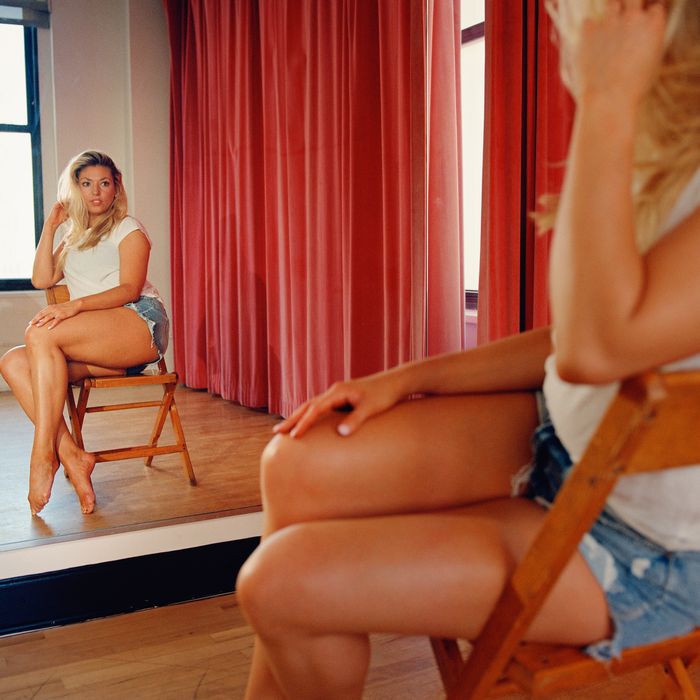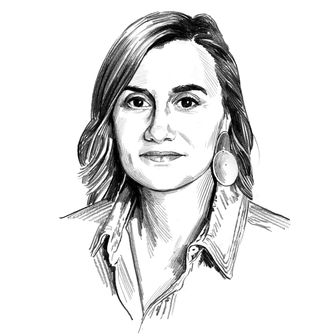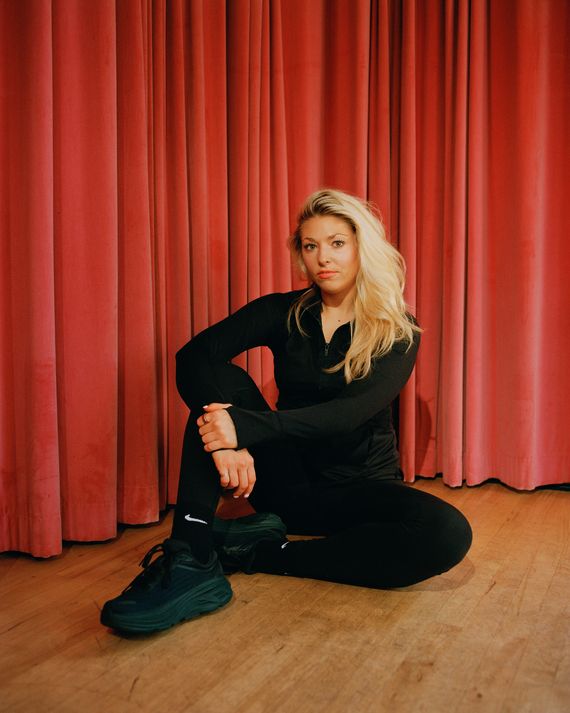
On a humid mid-August evening, Victoria Kalina tells me to give her sexy eyes. Standing in front of a mirrored wall at a midtown Manhattan dance studio, her blonde hair cascading loose down the back of her pink shirt, she asks, “Who’s your man crush?” Paul Mescal, I confess. “I want you to imagine he’s here,” she says, “and turn to look at me.” She counts me in — five, six, seven, eight — and I snap my head to meet her stare, trying to look seductive as my six-and-a-half-month pregnant belly bursts out of my spandex shorts. “Ya! That was great, like, fierce,” she says with the encouragement of a kindergarten teacher praising a student’s crayon drawing. “Now I want you to smile with it.”
Throughout her four years with the Dallas Cowboys Cheerleaders — “DCC,” if you’re a fan — Kalina spent dozens of game nights with her own bright-white-toothed smile stretched so wide it might break. Growing up, DCC was religion in her house. Her mother, Tina, cheered for the team in the ’80s and is close friends with Kelli Finglass, the squad’s director, and Judy Trammell, its head choreographer. Kalina first auditioned at 18, and though Finglass cut her from the team in a tearful, mascara-smudged moment caught on the CMT reality series Dallas Cowboys Cheerleaders: Making the Team, she tried out successfully the next year. Then in February, while Netflix was filming a docuseries about last season’s squad called America’s Sweethearts, Kalina made the difficult decision not to reaudition for what would have been her fifth and final year.
Kalina’s struggle to become a “group leader,” a senior position that is a typical mark of progression for veterans on the team, became a major story line on the series. (Her mother had the role and gushes onscreen about her time with DCC.) Despite showing up early to practice and mentoring junior members, Finglass and Trammell thought she lacked the energy on the field and chemistry with her teammates to warrant a promotion. “I think for them, leadership roles required popularity,” she says. “If you are friends with the girls, they’re gonna probably listen to you more. But it’s just like, no, that’s not the case.” Each year, the rookies also get to weigh in on that season’s prospective captains, and she got zero votes. In the show’s finale, after Finglass says point-blank, “What you’re not right now is a leader” as tears rolled down Kalina’s cheeks, she announces her decision to leave with an uncharacteristic amount of self-confidence: “Yes, I could prove them wrong, and yes, I would love to,” she says into the camera, “but I don’t need to.”
Now, for the first time in her life, the 24-year-old has moved out of her childhood home in Coppell, Texas, and into a studio-apartment sublet in Chelsea. It’s a big change for someone whose bedroom looked like a girlish shrine to the DCC and whose momager, Tina, made her lunch and helped her stretch throughout the series. She and Tina are coping with the separation by texting and FaceTiming daily. It’s tough to be apart, but they both know she’s living out a childhood dream. “I’ve always said ‘Mom, I want to be a star,’” Kalina tells me. “‘I want to be up on Times Square.’” And now she is: While staring up at a billboard for the Netflix show earlier this summer, Kalina says she was swarmed by teenage girls and their moms, thanking her for being so candid about her mental-health struggles on the show. While many fans related to her underdog narrative, Kalina also had plenty of detractors. “She seems incredibly insecure and validation seeking and that is exhausting to be around,” commented one person on TikTok, while others thought her so-called vulnerability was a sinister ploy for screen time. As another TikToker wrote, “She made herself the victim to get fame.”
Today, Kalina is teaching classes at Ripley-Grier Studios, where dancers audition for Broadway musicals and TV shows, while she trains to try out for the Rockettes in the spring. “Every time I watch them, I get chills, if not cry,” she says. “That’s where I want to be.” The routines performed at Radio City Music Hall are more technically rigorous than what Kalina is used to. Dancers need to have a solid background in ballet, precision jazz, and tap dance to be considered — plus, she’ll be kicking in high-heeled LaDuca tap shoes as opposed to cowboy boots, which puts a lot more pressure on her feet. The audition process is competitive, and Kalina knows it’s rare for first-timers to land a spot. “Some girls have been training over seven years for this,” Kalina says. Her training coach, a former Rockette who was on the team for 12 years, told me, “It’s actually harder to get into the Rockettes than Harvard.” If this all sounds like Kalina is just trading one punishing group with exacting standards for another, she insists this time will be different. “I have a more professional attitude,” she says. “I’m here for the job, rather than, ‘Oh, I’m here for friends.’”
By her own admission, Kalina craves validation. Without positive feedback, she says, “I feel very lost. I start to think, Am I doing the right thing? And questioning everything.” At DCC, an organization that dictates everything from the shade of makeup cheerleaders must wear to how much they should weigh, Kalina never got enough affirmation. For years, she’s struggled with depression and an eating disorder that she says were exacerbated by the pressure of being a Cowboys cheerleader. DCC dancers must be superhuman, suppressing their own needs and emotions to portray pom-pom perfection (this selflessness extends to their paychecks: While the top Cowboys players could make as much as $40 million a year, cheerleaders earn between $15–$20 per hour, depending on their seniority.) During the 2021 offseason, without game days to distract her, Kalina says her mental health hit rock bottom and she decided to take the next year off. (A former teammate told Netflix that she’d “never seen a bitch happier” than Kalina was during her hiatus.) She started going to therapy and taking antidepressants, but upon her return to DCC for her third year, she still didn’t feel accepted by the team and its top brass. “I almost felt like I was looked at as weak,” she says. “I felt like I was a rookie again. It was just like, ‘Well, why am I starting from square one when I just went away to make myself better?’” As one of the team leaders puts it in the Netflix series: “When you haven’t been around for a year, there’s always going to be a feeling that you’re kind of an outsider.” Kalina claims that she wasn’t getting the same high-profile dance placements as other senior members and was being iced out by the other cheerleaders. “It started from the top with Kelli and Judy,” she says. “They kind of had their distance with me because of our family relationships and everything. And so the girls also had that.” The documentary shows Kalina trying and failing to make conversation with teammates in the locker room and celebrating a 24th birthday with just her mother, sadly forking at a piece of pink cake. She later told news outlets that her teammates didn’t show, but they denied her account, posting to social media that Kalina had never invited them in the first place. This sparked a debate online, with some pledging their allegiance to Team Victoria while others claimed the math didn’t add up. “I think that a group of 35 women not liking 1 is very telling,” wrote one person on TikTok. Kalina tells me she doesn’t know why they denied her account of what happened, and that, honestly, she’s sick of talking about the whole thing. “I am very conscientious of my actions and how I’m treating people,” she says. “And I think sometimes maybe they’re just, like, caught up in the moment.”
In late May, Kalina and the other dancers gathered at the Dallas Cowboys’ headquarters to preview a few episodes of America’s Sweethearts together. After watching the first, in which Finglass and Trammell make snide remarks about Kalina’s stiff dance moves and lack of team friendships, she made up an excuse to leave early. “I was like, ‘Are you serious?’” she tells me. “‘I’m trying to bring what I think is my best for you and it’s just being totally degraded.’” She watched the rest of the episodes alone in New York. Some moments, like seeing how puffy her face looked after what she called “a binge episode,” set her heart racing. “I’m just kind of embarrassed that I allowed myself to let the organization affect me that way,” she says. Others, like watching Finglass tell her in their final conversation that “your last season was not your strongest,” made her angry all over again. When I ask how she feels about Finglass now, she pauses for several seconds and looks away. Then she turns back to fix me with her widest, sparkliest, self-censoring smile and says, “No comment.”
When I texted my group chat a picture of Kalina and me after our interview, one of my friends responded, “I’ve been so worried about her. Please confirm she’s okay.” When we meet for a walk to Bryant Park, she strides down Broadway with an iced green tea from Starbucks in one hand, taking in the midtown high-rises. ”I feel like everything seems possible here!” (Later, a pigeon almost flew into her head, and I made her Google a photo of “rat king” for balance.) Wearing a baby-doll dress and a light dusting of eye shadow, she still looks Barbiecore, but her hands are visibly stained orange from self-tanner and she’s showcasing toenails that are cracked and yellowed from being shoved into dance heels — imperfections DCC would never allow in public. “I feel like I’m fully me now,” she says. Kalina’s already made a “new bestie” whom she met in a dance class and has even been invited to some Fashion Week shows. Of course, there are challenges. “Whenever I’m not on the go, go, go, and I’m finally at home, it can sometimes be very lonely,” she says. But while the series showed other dancers struggling with reality after leaving the squad, Kalina swears she feels reborn. “I popped that bubble,” she says, sticking out a finger and smacking her lips together. “I didn’t sink into that ‘DCC is my everything.’”
When she’s not training to audition for the Rockettes, Kalina is teaching private and group dance classes to teenagers and young women with the energy of someone who just chugged a Charged Lemonade from Panera (and, yes, she still plays AC/DC’s “Thunderstruck” as a warm-up). At Ripley’s studio, I watch her reassure a 20-year-old who is worried her routine “sucked” that she just needs to stop second-guessing herself. After the private lesson, the student’s mother tells me that Kalina is “probably the best instructor this kid’s ever had.” Later that night, 15 other students from a group class crowd around Kalina, lining up for hugs and selfies. “I’m just fangirling,” says a former cheerleader turned elementary-school teacher when her turn comes. Kalina has not spoken to Finglass for a few months, since attending her daughter’s wedding, and doesn’t plan to personally tell her or Trammell if she makes the Rockettes. “They can see it through posts and updates,” she says. “I do think I am thriving, and I do hope they see that. I think they do.”






